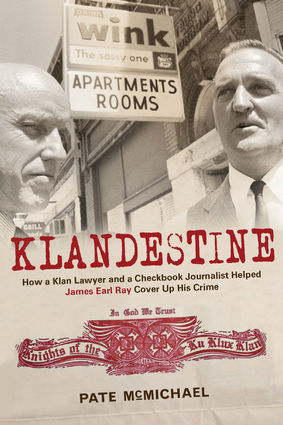Overview
James Earl Ray, an escaped convict from Missouri, was punished for the assassination of Martin Luther King Jr. despite the fact that he did not fit the caricature of a hangdog racist thirsty for blood. The media has often portrayed him as hapless and apolitical, someone who must have been paid by clandestine forces, and it’s a narrative that Ray himself put in motion upon his June 1968 arrest in London, then continued from jail until his death in 1998. Klandestine documents the evolution of Ray’s alibi from 1968 to 1999—the year Dr. King’s own family declared him an innocent man—yet argues that he was indeed motivated by racial hatred and did in fact pull the trigger. It closes the book on the conspiracy that Ray and his defense team created, which asserted that Raoul, a mysterious seaman with deep connections to the criminal grapevine, framed Ray as part of a complicated New Orleans–based conspiracy. Ray brought Raoul to life by forging a lucrative publishing partnership with two very strange bedfellows: a slick Klan lawyer named Arthur J. Hanes, the de facto “Klonsel” for the United Klans of America, and checkbook journalist William Bradford Huie, the darling of Look magazine and a longtime menace of the KKK. Despite polar opposite views on race, Hanes and Huie found common cause in the lucrative world of conspiracy; together, they thought they could make Memphis the new Dallas. Told chronologically through Hanes and Huie’s key perspectives, this unique vantage shows how a legacy of unpunished racial killings—combined with fevered interest in political assassinations—provided the perfect exigency to sell a reckless and lucrative conspiracy to a suspicious and outraged nation.
Reviews
"Because such true stories about government smoke screens and unanswered cries for justice have echoes in the 21st-century American criminal justice system, the author's narrative remains topical and relevant. McMichael ably leads readers to the conclusion that, in this case, no one's hands were clean." —Kirkus Reviews
“This is a compelling book, a detailed and well-documented story about a killer, a racist lawyer, and an avaricious journalist… A worthwhile contribution to most civil rights collections.” —Booklist
“Pate McMichael not only puts to rest the legend of a conspiracy to kill Martin Luther King Jr. but, in lucid, compelling prose, he also demonstrates how that legend was constructed, and why it persists. Anyone interested in civil rights history, the 1960s, King, or conspiracy theories—or just a great story—should grab this book and hold on tight.” —Clay Risen, author of The Bill of the Century: The Epic Battle for the Civil Rights Act and American Whiskey, Bourbon & Rye: A Guide to the Nation’s Favorite Spirit
“Backed by deep research and driven by a fast-paced narrative, Pate McMichael’s new book sifts through the fog of conspiracy theories, illuminating how an unlikely pair constructed James Earl Ray’s alibi for the assassination of Martin Luther King.” —Aram Goudsouzian, author of Down to the Crossroads: Civil Rights, Black Power, and the Meredith March Against Fear
Author Biography
Pate McMichael is an award-winning journalist. His stories have been published in Atlanta magazine, Saint Louis magazine, Zócalo Public Square, and elsewhere. He lives in Madison, Georgia.
 Mother's Day
Mother's Day Father's Day
Father's Day
